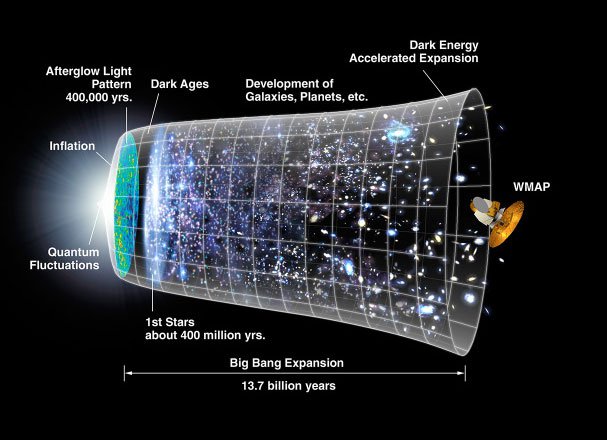There’s been some very interesting new developments in cosmology recently. I’ll highlight the bits here.
The first was the big media claim that the Big Bang didn’t happen. This is a case where people without a deep understanding of science are writing about things that require a deep understanding of science… and getting it wrong. The Big Bang is not discredited. This paper does not mean that the Big Bang never happened. Part of the problem is people’s misunderstanding of the Big Bang.
The Big Bang was not an explosion. It was not a chemical or even nuclear reaction. It was an expansion. What expanded? Everything. The universe itself.

It’s very difficult for people to image this kind of thing. It takes a lot of practice to think about things in ways that we’re not used to. A mildly useful analogy is to think about the space that you are sitting in right now. Now image that the space itself is getting larger. The walls are pulling away from you and getting larger (by becoming thinner). The molecules in the air are getting further apart. Everything is becoming less dense. It will start getting cooler in the room. That’s just basic thermodynamics.
So the universe expanded, rapidly. The current best idea is that during a period called the inflationary epoch, which lasted from 10−36 to about 10−33 seconds after the big bang, the universe increased in size by 1028. The nice thing about inflation is that it produces predictions that are testable. While the results are totally in, the support for inflation is pretty good.
The real question, and this goes to the heart of what our universe is like, is what happens when we go backwards in time? That’s what we would like to know… how did our universe start?
The thinking over the last few decades is that the universe started out as a singularity, a point of infinite density that expanded into the universe we have now. This make sense, if something is expanding, then going backwards in time means that thing is contracting. It should get smaller and smaller until it’s infinitely dense.
The problem is that physicists don’t like singularities. The reason is that math and known physical laws don’t work in them anymore. It’s like asking a calculator to divide by zero. It just doesn’t work.
Likewise, the beginning of the Big Bang is a mystery, because of that singularity. We can predict the state of the universe up to a time about 10−37 seconds after it began. The singularity is predicted by General Relativity. And that’s where all the fuss is. General Relativity is a powerful and well supported theory. But it results in that singularity, which is problematic.
The paper in question is titled “Cosmology from quantum potential” (here). This new research suggests that by using General Relativity modified with some quantum tweaks, the universe didn’t actually start with a singularity. It doesn’t mean that the Big Bang didn’t happen. It happened, that’s a well supported theory. But what started it, may now be understandable.
Keep in mind that this is bleeding edge research. This isn’t even quite to the hypothesis stage yet. This is a proof of concept. But it does have some surprising features.
The model does include a cosmological constant, which is a candidate explanation for dark energy, which is the proposed cause of inflation and expansion of the universe.
The other feature is that the model pushes the “time singularity indefinitely, and predicts an everlasting universe.”
But doesn’t that mean that the Big Bang is wrong?
No. it just means that the ultimate cause of the Big Bang wasn’t what we thought it was. Instead of an infinitely dense, zero volume point that began expanding, this model shows that the universe has always had the quantum potential to become a universe.
You can think of it (another analogy) this way. It is possible to reduce the temperature of pure water below 0ºC with it turning into ice. It remains a liquid even at below freezing temperatures. Then something happens. And the entire volume of water rapidly becomes ice. Something like this.
In this analogy, the ice is the universe we know now and the water was the “pre-universe” or the quantum potential to be a universe.
So, that’s the idea. This new paper does not mean that the Big Bang theory is dead. It just is an alternative (and attractive) explanation for how the universe started.
We will have to see if this idea has merit by conducting experiments and observations to see if it actually works.
